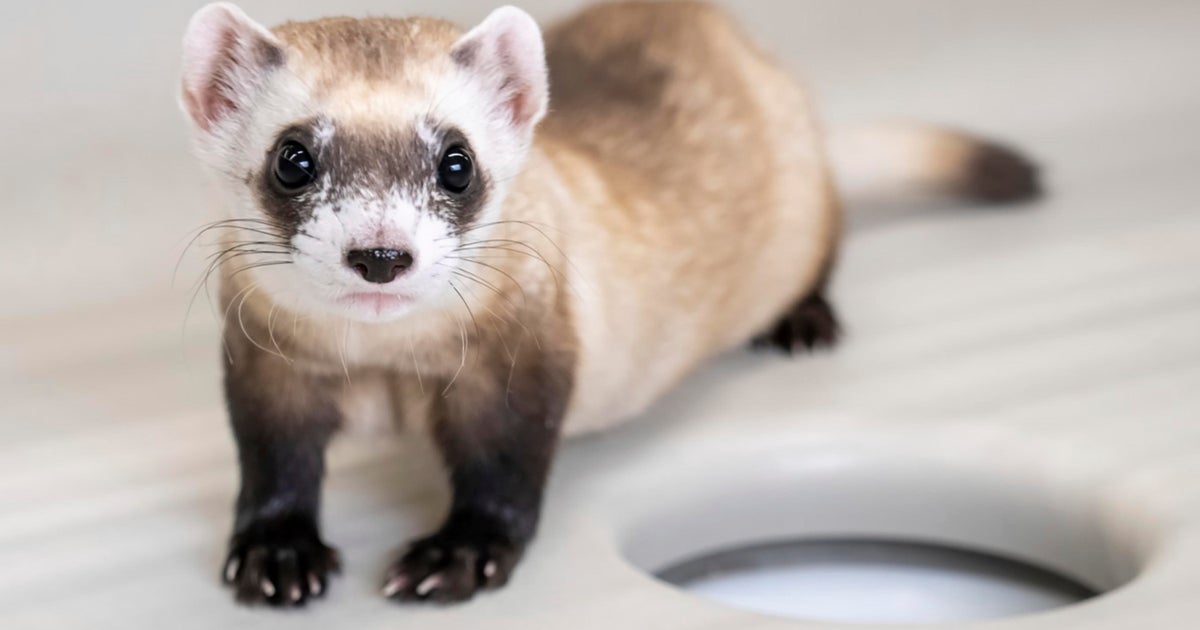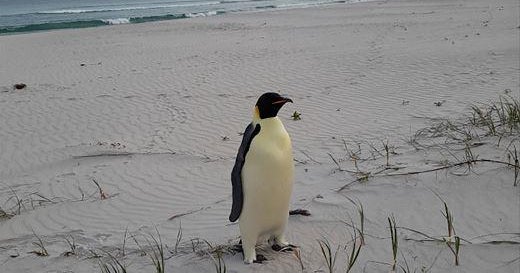CBS News
2 more endangered ferrets cloned from animal frozen in the 1980s: “Science takes time”

Two more black-footed ferrets have been cloned from the genes used for the first clone of an endangered species in the U.S., bringing to three the number of slinky predators genetically identical to one of the last such animals found in the wild, the U.S. Fish and Wildlife Service announced Wednesday.
Efforts to breed the first clone, a female named Elizabeth Ann born in 2021, have failed, but the recent births of two more cloned females, named Noreen and Antonia, in combination with a captive breeding program launched in the 1980s, are boosting hopes of diversifying the endangered species. Genetic diversity can improve a species’ ability to adapt and survive despite disease outbreaks and changing environmental conditions.
Kika Tuff / AP
“More diversity is better. Then, you’re more prepared for things like change, climate and otherwise,” Dr. Della Garelle, a FWS veterinarian who works with the ferrets, told CBS “Sunday Mornings” in 2023.
Energetic and curious, black-footed ferrets are a nocturnal type of weasel with dark eye markings resembling a robber’s mask. Their prey is prairie dogs, and the ferrets hunt the rodents in often vast burrow colonies on the plains.
Black-footed ferrets are now a conservation success story – after being all but wiped out in the wild, thousands of them have been bred in captivity and reintroduced at dozens of sites in the western U.S., Canada and Mexico since the 1990s.
Because they feed exclusively on prairie dogs, they have been victims of farmer and rancher efforts to poison and shoot the land-churning rodents – so much so that they were thought to be extinct until a ranch dog named Shep brought a dead one home in western Wyoming in 1981. Conservationists then managed to capture seven more and establish a breeding program.
But their gene pool is small – all known black-footed ferrets today are descendants of those seven animals – so diversifying the species is critically important.
Noreen and Antonia, like Elizabeth Ann, are genetically identical to Willa, one of the original seven. Willa’s remains — frozen back in the 1980s and kept at the San Diego Zoo Wildlife Alliance’s Frozen Zoo — could help conservation efforts because her genes contain roughly three times more unique variations than are currently found among black-footed ferrets, according to the Fish and Wildlife Service.
There are more than 10,000 samples at the Frozen Zoo, everything from skin to feathers, CBS News’ Jonathan Vigliotti reported last year.
“When I was freezing cells from the northern white rhino, there were 50 living. And then now, there’s two left,” Curator Marlys Houck told Vigliotti.
Barbara Durrant, the director of reproductive sciences at the Frozen Zoo, said their bank of cells could help save an estimated one million species at risk of extinction, mostly because of humans.
And in some cases, a species’ depleted population might only be corrected by science. Durrant said, “If we disappeared, a lot of things would grow back. But some populations are so small, or don’t even exist except here, that they would not be able to regenerate without us.”
Elizabeth Ann still lives at the National Black-footed Ferret Conservation Center in Fort Collins, Colorado, but she’s been unable to breed, due to a reproductive organ issue that isn’t a result of being cloned, the Fish and Wildlife Service said in a statement.
Biologists plan to try to breed Noreen and Antonia after they reach maturity later this year.
The ferrets were born at the ferret conservation center last May. The Fish and Wildlife Service waited almost a year to announce the births amid ongoing scientific work, other black-footed ferret breeding efforts and the agency’s other priorities, Fish and Wildlife Service spokesman Joe Szuszwalak said by email.
“Science takes time and does not happen instantaneously,” Szuszwalak wrote.
Cloning makes a new plant or animal by copying the genes of an existing animal. To clone these three ferrets, the Fish and Wildlife Service worked with zoo and conservation organizations and ViaGen Pets & Equine, a Texas business that clones horses for $85,000 and pet dogs for $50,000.
The company also has cloned a Przewalski’s wild horse, a species from Mongolia.
CBS News
Trump’s reelection looming large over G20 summit

Watch CBS News
Be the first to know
Get browser notifications for breaking news, live events, and exclusive reporting.
CBS News
Biden reaffirms U.S. support for Ukraine at G20 summit

Watch CBS News
Be the first to know
Get browser notifications for breaking news, live events, and exclusive reporting.
CBS News
Examining both sides of debate over arming teachers with guns

Watch CBS News
Be the first to know
Get browser notifications for breaking news, live events, and exclusive reporting.








